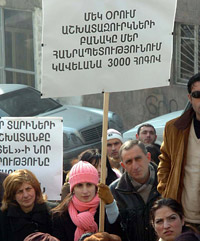Tens of Internet Service/connection provider workers organized a protest on Monday in front of the Public Services Regulatory Commission building. The posters of the demonstrators that had gathered at 11:30 a.m. read: “The number of unemployed will increase by 3000 in one day”, “We demand licensing”, etc. Demonstrators were shouting “Na-zar-yan” while the commission representatives were holding talks with the commission president in front of journalists.
During a session on January 8, 2007, the Public Services Regulatory Commission decided to prohibit the Internet Service/telephone connection providers to allow sound transmissions because, according to the reedited version of the #60 license of 2004, “ArmenTel” has the exclusive right for sound transmissions. Later, on January 16, chief executive director of “ArmenTel” Oleg Bliznyuk announced that he was going to turn off IP-telephone connection companies from his network starting from January 25 because those companies are unauthorized. O. Bliznyuk also announced that the 300 illegal IP-telephone connection providers working in the market “steal traffic from them and “ArmenTel” can’t tolerate that.”
The “ArmenTel”/providers quarrel began in September 2006 when “ArmenTel” deprived the companies of the opportunity to provide their services. As for “ArmenTel” restricting the IP monopoly, Bliznyuk stated that it’s not all in a day’s work; there have to be legal and technical grounds for that. So, the demonstration on Monday was the direct response to the process. Representatives of the IP companies presented a demand/intermediation to the commission on Monday to review the January 8 decision. They demanded that taking into consideration its competencies, the commission would call back that decision for a 180-day grace period until “ArmenTel” joint-stock company was deprived of its monopoly of providing sound transmissions. One of the members of the Internet Service Providers organizational committee said that “ArmenTel” had offered them to sell their services, which was simply unacceptable. “Any entrepreneur or businessman can receive the package deal and do what needs to be done,” said one of the demonstrators. During the meeting with the providers, president of the Public Services Regulatory Commission Robert Nazaryan mentioned that the commission is taking responsibility after January 1 and advised the representatives of the provider companies to appeal to the court instances to debate the results of the commission’s activities before the abovementioned date.
“We are not responsible for what happened before that. If you have a complaint about our decision, appeal to the courts; we’ll be the defendants and answer any questions that you may have. When we set quality standards and provide services lower than those standards, we will call you as licensed companies and take necessary measures,” announced R. Nazaryan. “We have applied to the corresponding governmental corpuses, received the license (Ministry of Transportation and Communication). In 2007, a third corpus comes and says that he has nothing to do with the one before. This predicts that if a change of power takes place in 2008, and new authorities come to power, they might say that what we were told in the past was a lie. No, that’s not the way things work, Mr. Nazaryan,” said one of the representatives and suggested that Nazaryan come down and instill hope in the people who have completed hard and noble work that they are not going to work for the next four months. The commission president refused to meet with the demonstrators and give them hope. He said that he was sorry for the situation at hand, but the decision of the collegial body tried to find solutions, which would keep the business going.
“If you find that we could have done something and haven’t, then apply to the corresponding bodies,” added R. Nazaryan.
The protesters against the decision of the commission stated that the reason for not applying to other bodies was that the final regulator of this issue, in other words, the arbiter was the commission.
“We haven’t stolen from anyone and have run business on our own. We have never worked secretly. We have some written replies from the Ministry of Transportation and Communication that what we are doing is legal,” claim the representatives of the provider companies. According to head of the “Dashink” cadre center Artyom Khachatryan, last year they received official statements from the ministry that they are not violating the monopoly rights of “ArmenTel”.
“After all that, they tell us to not work for a couple of months until they elaborate the licensing order. On September 7, when “ArmenTel” shut down our telephone connection for the first time, it took a couple of months before the issue was raised at the administrative level and then “ArmenTel” turned it back on. But we weren’t expecting this kind of solution to the problem. “ArmenTel” should have solved its technical issues with the previous regulatory commission. It should come up with new rules and regulations and tell us to work according to those regulations. That’s an acceptable version in a constantly developing field,” assures A. Khachatryan. He is also unemployed and blames the Public Services Regulatory Commission because if the latter classified the sound transmissions, then it needed to elaborate a new licensing order, fix a new state tax, just like they do in “civil” countries. Will “ArmenTel” turn off the telephone connection starting from January 25 based on the promise? In response to that, A. Khachatryan said that yes, it will turn it off because “ArmenTel” is known for doing similar things.
“But it’s obvious that we’re not going to put up with that. Whichever telephone operator it is; we are citizens of this country and don’t want to become anybody’s slaves. Our organization will apply to the courts because after all, we have nothing to lose. The officials calmly say ‘go and sue us’, because we have a judicial system like no other,” says Khachatryan disappointed and is certain that the court may reaffirm the commission’s decision.

